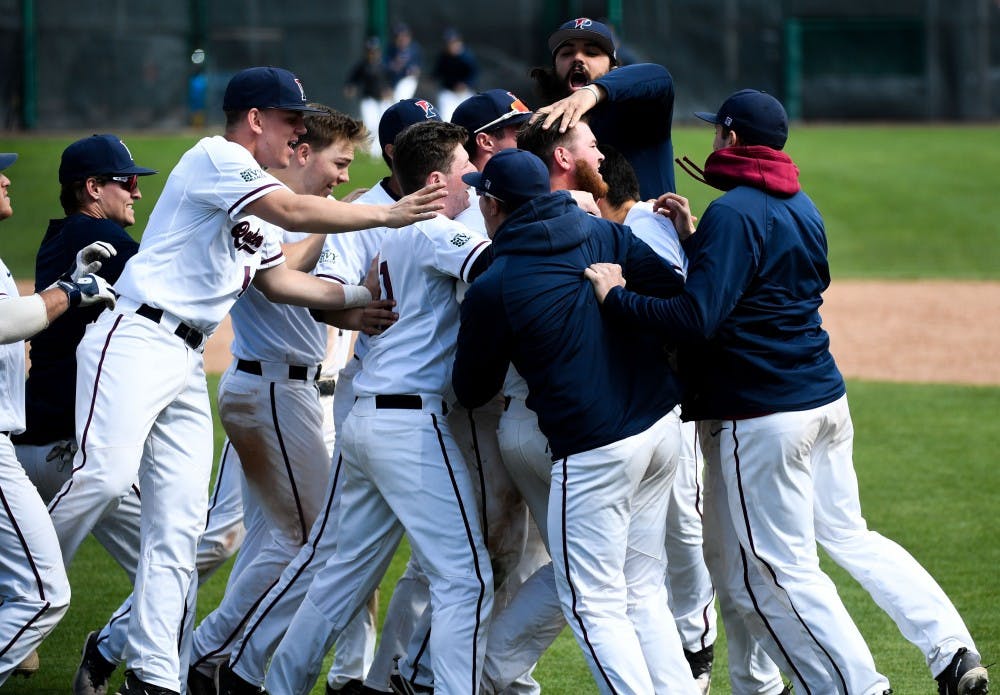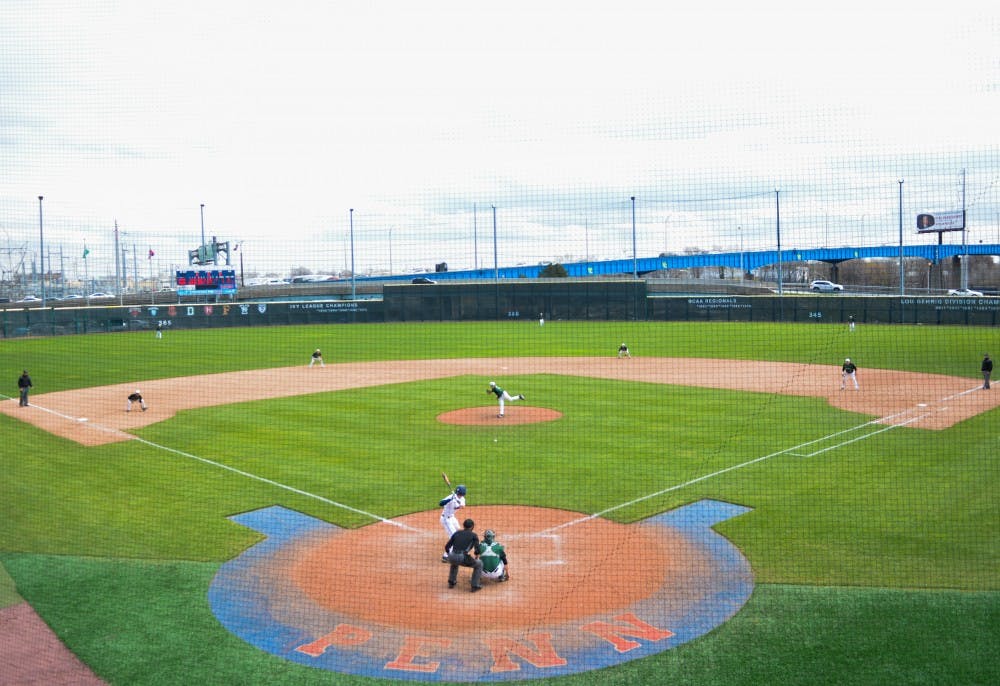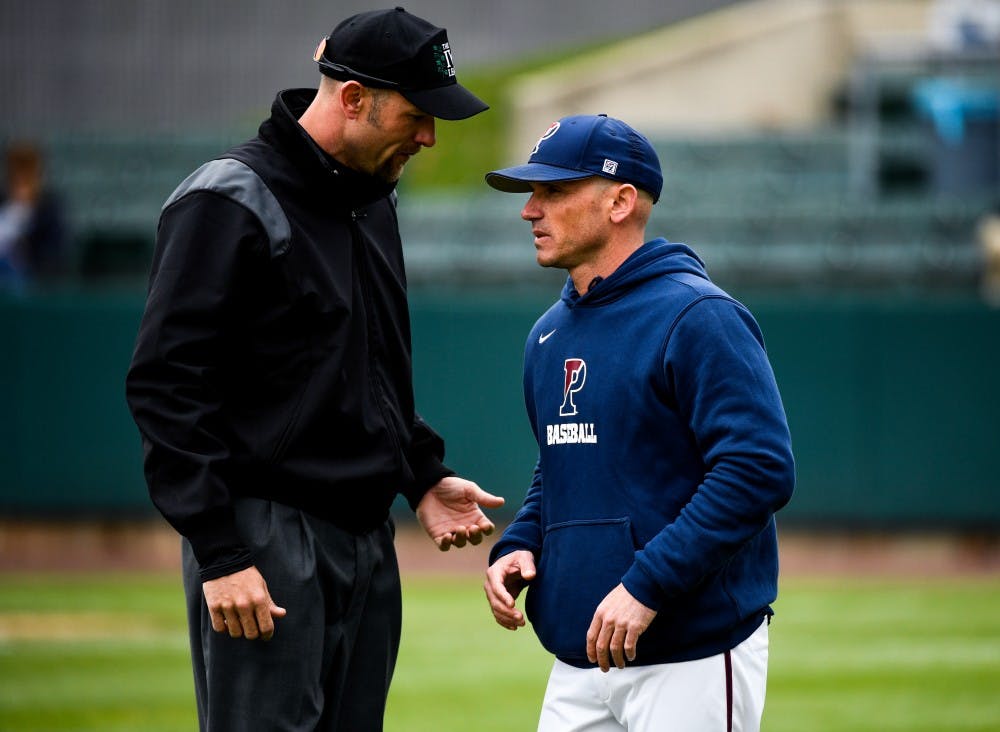
According to second-year Penn law student Reid Hopkins, Penn baseball games might not be the flashiest event on campus, but they are still beautiful in a way that all should be able to appreciate.
Credit: Chase SuttonThe Penn baseball team began its season more than a month ago, on Feb. 23. Before this past weekend, the team had played 19 games, boasting a record of 5-14 and beginning Ivy League play with one win from three close games at Brown. Despite being so deep into its season, however, the weekend series against Dartmouth marked a fresh start for the Penn squad: for the first time all year, they were playing at home.
Meiklejohn Stadium, the Quakers’ home field, sits at the southernmost tip of what is still, technically, the Penn campus. It was built in 1999 on the ground between Highway 76, the train tracks, and Penn’s enormous, metallic, always-humming water cooling facility. As you watch a game at “the Meik," cars zoom by behind the outfield wall, the occasional freight train blows its horn too close to the stands, and, sometimes, you feel water droplets hit your skin, thrown from the metal behemoth that sits behind you. Games are all played during the day because there are no lights. The stands, which could probably squeeze in 1000 spectators for a standing-room-only game, are usually sparsely filled by family members of players on either team, local baseball die-hards, and the occasional group of Penn students.

Meiklejohn Stadium
The option to spend an afternoon at this ballpark, when it does occur to members of the Penn community, does not strike most as the best use of their time. In the absence of popular support, the vast majority of people on hand for Penn’s home games, both in the dugouts and the stands, are there because they love the game or someone playing it. They spend an enjoyable afternoon together, surrounding talented students who sustain a beautiful pastime.
And, wouldn’t you know it, our team has a way of putting on a show. Players shout encouragements to pitchers and batters from the dugout, dance to one another’s walk-up songs, and join with the home fans in excoriating umpires who make questionable calls against the team. While they’re at it, they also play great baseball. Never mind that the Ivy League does not field serious contenders for the College World Series. Most of us who love the game stopped being competitive in our early teens. Even though the vast majority of these guys are textbook examples of the NCAA athletes who will “go pro in something other than sports,” their athletic careers are success stories — they’re playing Division I baseball. So, if you enjoy the game for what it is, a front row seat to the Quakers can easily be better than a distant view of the Phillies. You see the movement of the pitches; you feel the emotions of each team. If the MLB is the Food Network, Ivy League baseball is your grandparents’ kitchen — who cares if the food isn’t quite as good, it’s a better experience in many of the ways that matter most.
This weekend was a fine example of that. Saturday saw a close contest fall Dartmouth’s way, and Sunday’s doubleheader at first looked to be more of the same. In the first game, the Quakers headed to the bottom of the eighth down 6-3. But then Penn bounced back – two innings later they had sent the contest to extra innings. Each team homered in the tenth, and in the eleventh the home team pulled out a win.
The second game again called for late-game heroics. Headed to the bottom of the ninth, Penn was down 4-1. Again, they battled back, bolstered by the crowd’s collective discontent for the umpiring and a knack for saving their best at-bats for the moments when they were absolutely necessary. Three runs in the bottom of the ninth saw game two, like the first, head into extra innings.

Head Coach John Yurkow
But this time, the comeback would not be capped off by a game-winning run from either side. Because game one ran long, the second game started later than planned. So in game two, at the end of the eleventh inning, the sun dipped below the horizon. Unlikely to finish another inning before sundown, the umpires called the game. As it happened, both teams’ series record was 1-1-1; each had scored sixteen runs on the weekend. To call it anticlimactic would be to miss the significance of the moment.
This does not happen in the Major Leagues. If a game is suspended for any reason, it will be completed later. Though the NCAA allows ties when circumstances require it, teams in the major athletic conferences have lighted stadiums to prevent such a simple, predictable end as a tie due to darkness. But here, in our unlit stadium relegated to the industrial underbelly of campus, were a group of stand-out athletes calling a game because of a sunset, like I had to do with my friends as a kid. Half of them had to get back to New Hampshire, and all had class on Monday morning. No players wanted an amicable end to this bitterly fought contest, but that’s what they got.
It can be lost on people that the Ivy League was an athletic conference before it was a marker of academic prestige. Its students have been getting together to play games like these, in front of small but interested audiences, for generations. As sports have become more professional, even at the amateur level, moments like the one we saw Sunday have become rarer. Professional sports tend to abhor imperfect outcomes, and money (for lights or for the teams to schedule a trip to finish a game) can prevent almost any imperfection. But that’s not what we get in the Ivy League. Instead, we get a more natural conclusion: two teams giving a game their all, a smattering of onlookers highly invested in the result, and an outcome no one wanted – symmetrical, deserved, but at first unsatisfying – because nature doesn’t wait for perfect endings.
Reid Hopkins is a second-year student at Penn Law, an M.A. student in the Philosophy Department, and a graduate of Texas A&M University. He is originally from Houston, Texas and comments on his column can be directed to dpsports@thedp.com
The Daily Pennsylvanian is an independent, student-run newspaper. Please consider making a donation to support the coverage that shapes the University. Your generosity ensures a future of strong journalism at Penn.
Donate







